Chapter 20 - Softskills¶
8. Stress Management¶
Short story…¶
…from Carl Rogers's life
Five years ago, when Carl Rogers had the responsibility for his first project.
"I lie awake in bed at night; i can't sleep. The argument at the last meeting is still tormenting me. Eric had agreed to submit a progress report on his sub-project today, but he hadn't actually made any progress or delivered anything. Looking at the time schedule, I've got a real problem. I'm probably not going to make the deadline. The thought of the meeting with the steering committee that's scheduled for the end of the week is giving me insomnia. I'm probably going to be hung, drawn and quartered for being an incompetent project manager. Could I or should I have foreseen the problem with Eric? What could I have done? If only I'd had a plan for everything. What could I have done differently and what can I do better now?"
After another sleepless night, Carl Rogers wasn't able to go to the office. He decided to discuss his problem with a personal trainer. He outlined his problems again to Hannah Spalding and told her about the pressure he was under. "Well, I can't help you with the planning, I'm afraid. You'll have to talk to a professional about that. But I can help you to cope with the physical and mental burdens that a manager has", she encouraged her new trainee.
She explained: "Before I start, let me suggest some fast and effective methods of coping with stress. Then you can deal with its negative physical and psychological effects. I suggest that you start a programme tailored to your specific needs involving activities such as endurance, flexibility and power sports, muscle relaxation, saunas and massages. I'd like to put together a training plan with you and then we'll work through it together at the gym. From now on, we'll meet up four times a week to work on your stress management."
"How will I find the time to do that when I'm already on a tight schedule?" Carl looked questioningly at his personal trainer. That's why you'll have to discuss planning your work with an expert. I'm sure you'll find that there's scope for optimisation. You definitely should invest the four hours a week that I suggested in your physical fitness! I also recommend that you spend a weekend relaxing. It doesn't have to be an expensive spa weekend. Go walking with your wife, visit a museum and distract yourself by going to the theatre." Carl Rogers promised to follow her advice. "I'll sit down with my wife this evening and plan the weekend." Carl decided to make it happen. Despite having very little time to spare, he booked the lessons with his personal trainer for the coming weeks.
When he had discussed the plans for the weekend with Sabina and made a rough outline of what they would be doing, he described his general situation. "You know", she said, "You ought to sit down with Eric sometime soon and try to find out why things are progressing so slowly in his sub-project. It could be a very mundane reason or a serious one. Maybe he lacks competence. Maybe he's overfaced or maybe he simply doesn't want to work with you. Is he involved in the project enough? If it's one of those reasons, I'm sure you'll be able to solve the problem quickly. But I can imagine that the reason might be related to his family or to physical or mental problems."
"What about conflicts with colleagues?" asked Carl. "That's possible. But you'll never know unless you talk to him, Carl. Once the facts are on the table, you can work out a strategy for tackling the problem." "OK. I'll talk to Eric tomorrow."
Eric listened attentively to Dr. Rogers and, when he asked him for his opinion, he grasped the opportunity to say: "Let me be completely honest with you. I think you should reconsider the structure of the project. After the first workshops, you simply stopped involving the project team in the project. Especially the work package owners. They're being left out in the cold. They're important to the project, so give them the opportunity to get directly involved again. Trust your team more and delegate things to them."
"OK, I accept that. And I also accept that it would give the project team more cohesion. But how do I do it? I may have a PhD, but I'm still an amateur when it comes to project management methods", said Dr. Rogers. "Well, I suppose recognising that is the first step towards changing things", Eric smiled. "Do you remember our workshops at the outset of the project? We went through the work packages in the work breakdown structure and we had some hefty debates on which order to put them in. Being actively involved in the project really motivated the entire team! If we can introduce this kind of teamwork again, implementing the work packages won't generally be a problem. At least, it won't if you get a bit more active as project manager."
"So what do I have to do?" asked Dr. Rogers.
"You have to ask questions! You have to ask about the status of work packages and show that you're interested. If you know these things, you can respond quickly to problems, challenges and conflicts. You have to praise good work and small achievements and always remember that everything your project team members do makes a valuable contribution to the project.
Carl von Clausewitz said something very interesting on that subject. It goes something like this:
'A project manager has to endure many things and needs steady nerves. A project cannot be reduced to mathematical formulae because it involves a great many interconnected physical and psychological factors. Project management involves getting people with different character traits and views to cooperate. The only common denominator in the equation is the project manager.' "
"That's pretty impressive, Eric. But I'd feel better if I knew just which parameter in the equation I am." Carl Rogers winked at his colleague. "Thanks very much!" "No problem, Dr. Rogers..."
Carl Rogers checked the time. He'd got an appointment with his personal trainer and would be working out instead of eating a stodgy dinner.
Stress
Competitive pressure and frequent travel, work-related changes of residence, keeping work and family in balance, permanent pressure to perform and persistent time pressure - and in the end you are burnt out. What can a manager do in an age of increasing globalisation and 24/7 availability so that stress does not get you down?
There are many ways to deal with the various forms of stress, but first take a look at the phases of stress reaction. How does stress actually arise?
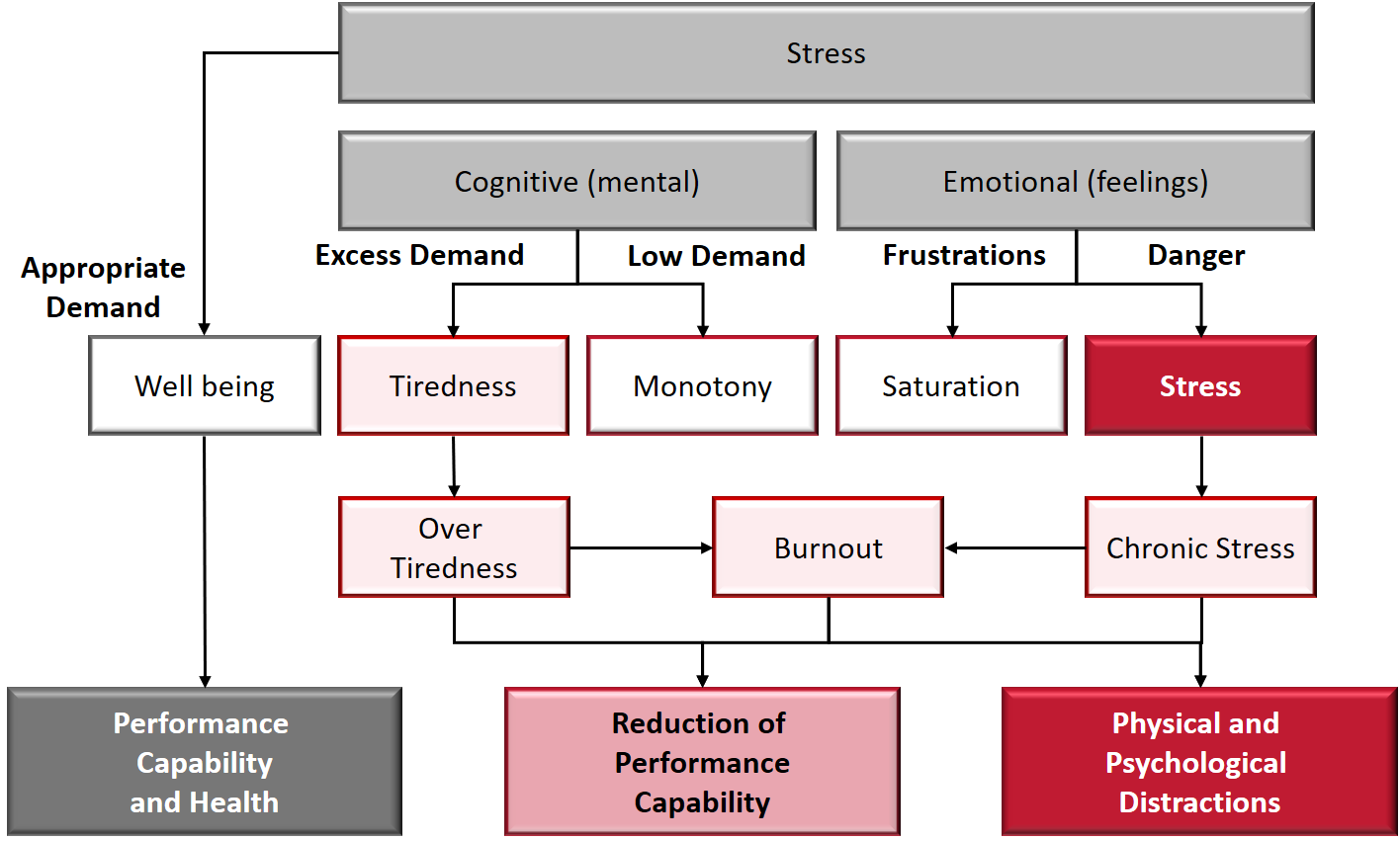
Biological explanation of stress¶
The meaning of stress is different for everyone concerned and the term stress is associated with quite different contents. Everything that affects a living organism and causes an activation reaction can be called stress according to scientific knowledge. But only when the organism is for certain reasons no longer able to adapt, stress has a harmful effect. Consequently, it is not stress as such that is dangerous, but excessive stress. The only thing that makes you ill is unhealthy permanent stress, which is caused by a mismatch between activities and relaxation. A stressful situation (stressor), is the situation that causes a stress reaction. However, because very different situations are perceived as stressful for different people, it is not possible to determine in a general way what exactly constitutes a stress situation. Only from the physical reactions of an affected person one can recognize and deduce that a stressful situation exists for him or her.
All individuals, constantly exposed to some kind of stressors, are constantly under stress action. This does not necessarily have to be perceived as stress. Moreover, stress is sometimes necessary for survival, because it enables people to be more efficient in many situations. However, this performance is only guaranteed as long as the stress reaction is not too strong or lasts too long, i.e. the person is not exposed to a permanent alert. In order to be able to develop efficient stress management strategies for one's own area of life, it is necessary to get to know the physiological processes involved in the stress process and the factors influencing stress behaviour a little better. To understand the physiological changes that an organism undergoes during a stress situation, it is necessary to look at the functioning of the nervous system.
The nervous system¶
The human being has a somatic and a vegetative nervous system. The somatic, i.e. influenceable nervous system is responsible for our thinking and behaviour as well as the entire motor system. The vegetative or autonomous nervous system, on the other hand, controls and coordinates the manifold bodily functions and processes that constantly take place in an organism but cannot be influenced by the human being and are therefore not accessible to the consciousness. The somatic nervous system controls all processes subject to consciousness and will, e.g. the movement of skeletal muscles. The vegetative nervous system, on the other hand, can hardly be influenced deliberately and controls the functions of the internal organs, smooth muscles and glands. The influenceable nervous system mainly serves our regeneration and is responsible for providing energy reserves. The uninfluenceable nervous system is responsible for the immediate mobilisation of required energies. Due to the very different functions of these two opposing systems, a highly differentiated and extremely complex mutual interaction constantly prevails in the nervous system. Both the somatic and the vegetative nervous system cannot be clearly separated in function and structure. While they are strongly intertwined in the central nervous system, they are predominantly separate in the peripheral nervous system. Both systems also have close relationships with the hormonal and immune systems.
If, for example, the uninfluenceable nervous system is addressed by a stressor and stimulated to release more adrenaline into the bloodstream, which causes a multitude of physiological processes and enables maximum performance, the entire organism switches to total action (flight or fight) or to total standstill (rigor mortis). These archaic emergency programs are stored in the brain and always run the same way as reaction patterns or protective reflexes. During the stress defence process, i.e. during escape or attack, all available physical forces and energies are mobilised and all bodily functions not essential for survival are temporarily paralysed.
Four phases of stress¶
The physical stress reactions take place in four phases: first, the human organism is in its specific normal starting position, i.e. all physiological values are in the middle range. If a certain signal, which signals danger from the outside, reaches the diencephalon, it enters the first phase, the alarm phase. This is when the organic stress function kicks in. Blood pressure and pulse rise, alertness increases and the angle of vision becomes narrower. In the second phase, the preliminary phase, almost all circulatory and metabolic functions are reduced to a minimum so as not to hinder the imminent mobilisation of energy. This reduction of the organic functions serves to gather all available forces. This second phase is known as the moment of shock. In the third phase, the so-called defence or action phase, the energies provided are used up by the stress management. This can be done by actively removing the stress triggers or by quickly fleeing the danger zone. In this phase, the person actively deals with his stress situation. The fourth phase is the recovery phase and brings a return to the normal starting position. The excitement subsides, circulation and metabolism normalise and stabilise.
This phase sequence is a sensible biological mechanism that guarantees an optimal and economical use of our physical forces and uses them in a targeted and concentrated manner in an emergency. If stress reactions take place in the manner just described, they are an important biological instrument for surviving in a stressful environment. It is important that the energies provided in the alarm phase are also used up in the action phase through efficient stress management and that the subsequent recovery phase also brings regeneration before new stressors trigger such a reaction chain again. These stress reactions, which are triggered by alarm signals (stressors) from our environment, occur in the same way to all of us. They form a natural survival mechanism that is genetically programmed in humans and animals alike.
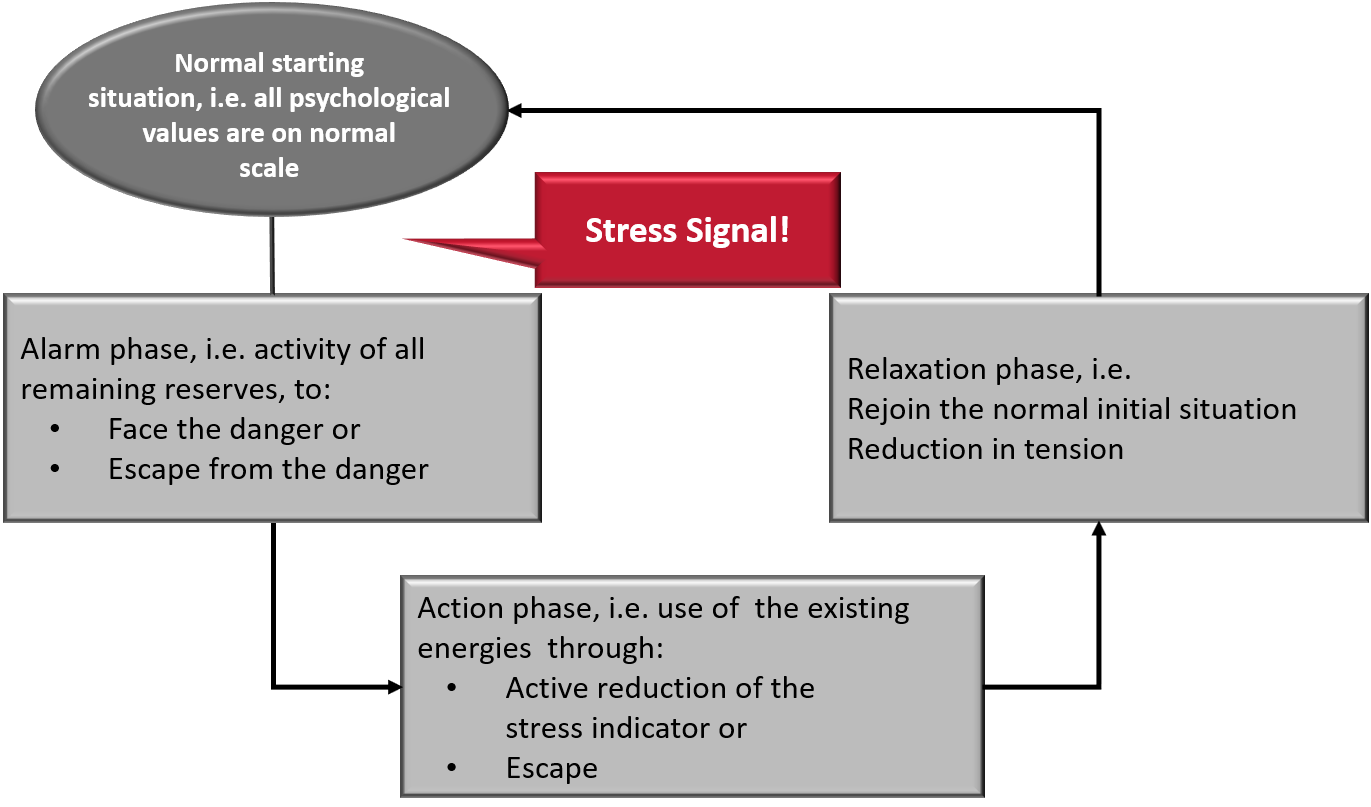
Effects of stress¶
But what about stress that has built up over the long term?
You have to create the necessary resources for your projects and also pay attention to your personal resources? Your attention is also focused on project culture, personnel development and health care? Make use of your social resources, i.e. your professional circle, your family environment and your friends and acquaintances. Improve your psychological resources, i.e. develop processing strategies, create space for recreation and increase your psychological resistance. Take your physical resources into account, attach importance to an excellent nutrition and a lot of exercise and, at best, avoid the consumption of addictive substances. If stress is your daily companion this can have a negative impact on your health and life:
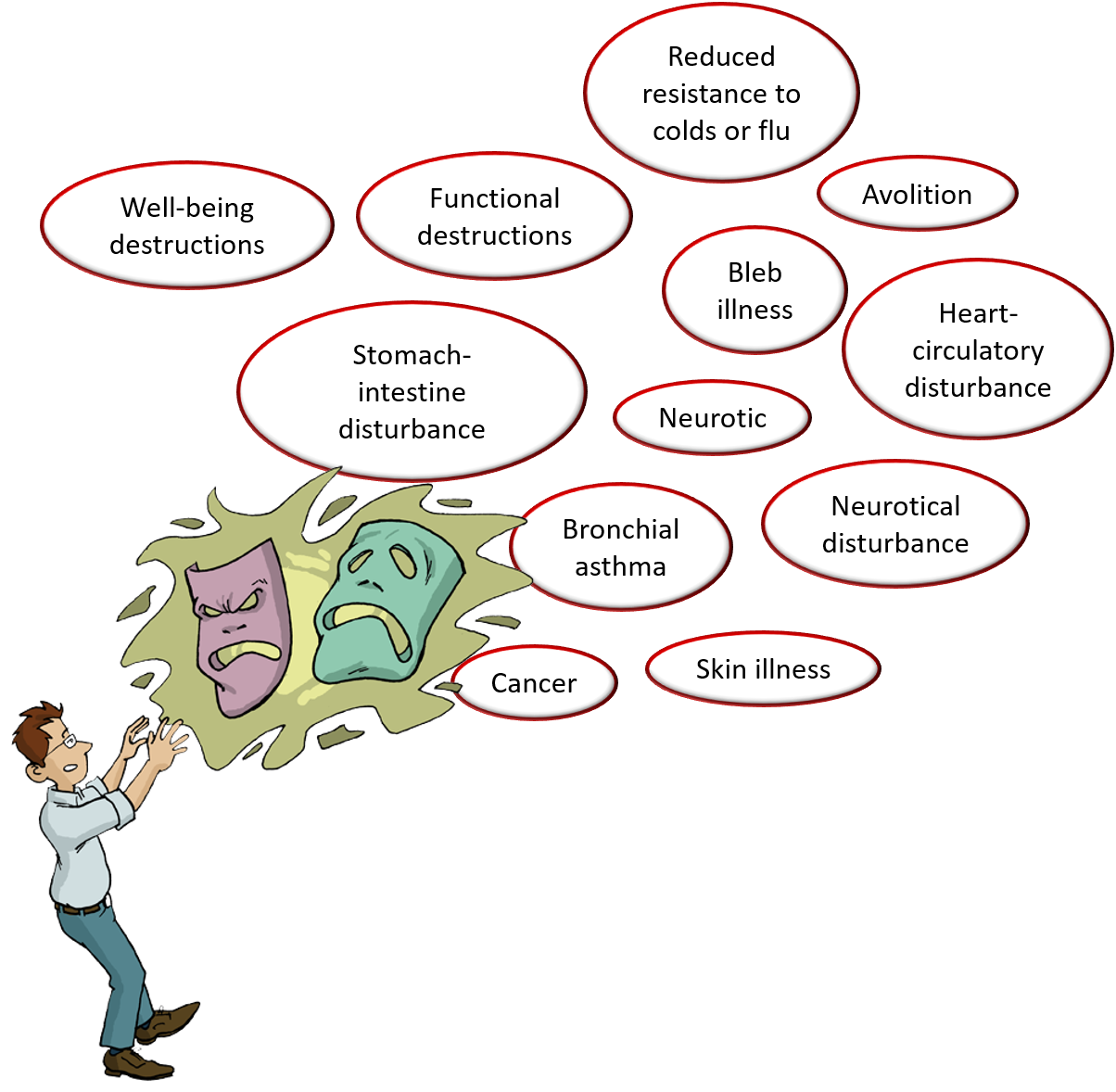
Do you suffer from stress? - perform a self-test
You don't need to print the test - even a piece of paper is sufficient to write down your answers:
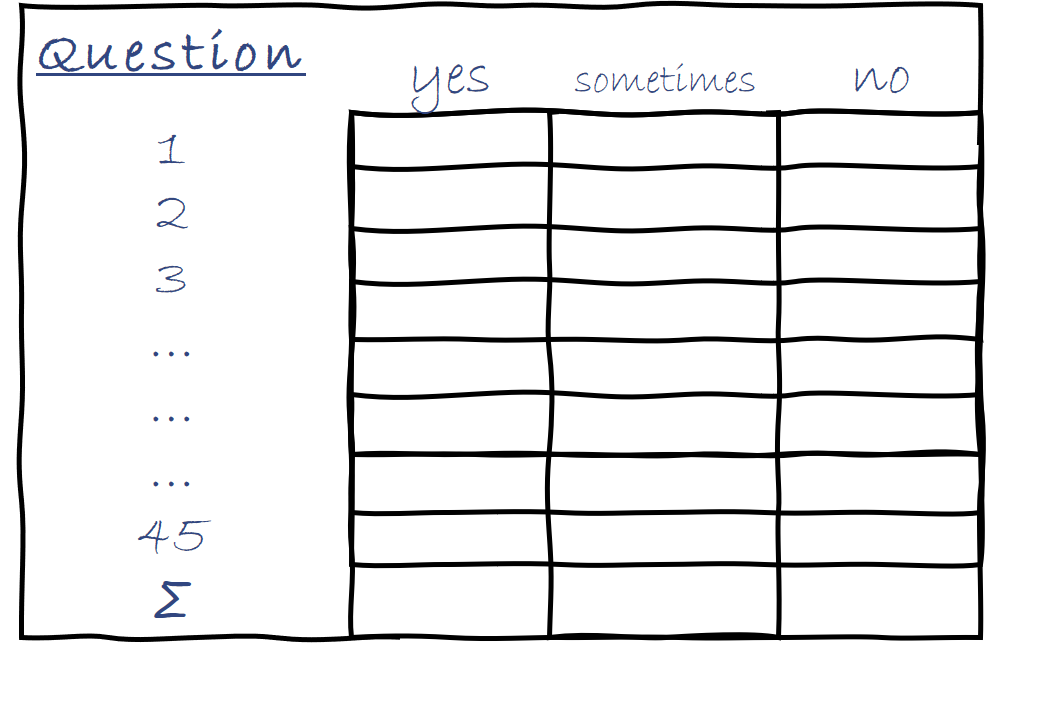
Environment-related stress factors
| No. | Question | Yes | Sometimes | No |
|---|---|---|---|---|
| 1 | Would you like to change something essential in your environment? | |||
| 2 | Do you have the feeling that you want to escape from your environment? | |||
| 3 | Do you often get upset about the behaviour of others (e.g. colleagues, superiors, your partner)? | |||
| 4 | Do you always try to please others? | |||
| 5 | Do you also base your personal decisions on the ideas of others? | |||
| 6 | Do you avoid conflicts with others by suppressing the causes? | |||
| 7 | Do you often provoke conflicts with colleagues or friends through your behaviour or attitudes? | |||
| 8 | Do you often have to spend much time waiting in traffic jams on your daily way to work? | |||
| 9 | Does the environmental pollution mean a heavy emotional burden for you? | |||
| 10 | Are political circumstances/decisions often a nuisance for you? | |||
| 11 | Are the expectations of others too high? | |||
| 12 | Do you often follow the values of others instead of setting up your own guidelines for your life? | |||
| 13 | Do you feel that everyone else is luckier than you are? | |||
| 14 | Do you depend on the goodwill and approval of those around you? | |||
| 15 | Do you believe that you would have been more successful under different circumstances, i.e. in a different environment? | |||
| ∑ | Now add up the number of crosses you have put for "Yes", "Sometimes" and "No" |
Task-related stress factors
| No. | Question | Yes | Sometimes | No |
|---|---|---|---|---|
| 16 | Do you feel indispensable at your job? | |||
| 17 | Do you usually have to work under time pressure? | |||
| 18 | Do you have to force yourself to work and are then completely exhausted afterwards? | |||
| 19 | Do you usually feel restless after work despite physical exhaustion? | |||
| 20 | Do you need stimulants to really get going? | |||
| 21 | Do you take your work and your problems home with you? | |||
| 22 | Do your thoughts drift away from your current job to tasks that you enjoy more? | |||
| 23 | Do you see your current work as pointless or dispensable? | |||
| 24 | Do you feel that the tasks you are working on are excessively or little demanding? | |||
| 25 | Is it impossible for you to plan your working time efficiently or to apply time-saving work techniques? | |||
| 26 | Do you think that your skills are not sufficient for your current field of activity? | |||
| 27 | Do you have difficulties to transfer your knowledge/skills into practice? | |||
| 28 | Are there too many obstacles in your career development? | |||
| 29 | Does your willingness to perform suffer from a demotivating leadership style of your superior? | |||
| 30 | Do you think that you have chosen the wrong profession or are currently doing so? | |||
| ∑ | Now add up the number of crosses you have put for "Yes", "Sometimes" and "No" |
Person-related stress factors
| No. | Question | Yes | Sometimes | No |
|---|---|---|---|---|
| 31 | Are you dissatisfied with your personal life situation? | |||
| 32 | Do you have inferiority complexes or a negative self-image? | |||
| 33 | Are you unable to relax and to tune out completely even in your free time? | |||
| 34 | Is it difficult for you to make decisions in your life and to enforce them? | |||
| 35 | Do you sleep poorly and do you feel tired in the morning? | |||
| 36 | Do you lack concrete goals and ideas in your life plans? | |||
| 37 | Do you feel that you have done everything wrong in life? | |||
| 38 | Are you very precise and over-ambitious in what you do? | |||
| 39 | Do you often feel tired, exhausted and listless? | |||
| 40 | Are you sensitive to noise and prone to headaches? | |||
| 41 | Do you often feel stir-crazy? | |||
| 42 | Do you think that other people are more successful in managing their lives? | |||
| 43 | Do you think that you are particularly disadvantaged by fate? | |||
| 44 | Do you assume that you are more of a pessimist? | |||
| 45 | Do you want to restart your life? | |||
| ∑ | Now add up the number of crosses you have put for "Yes", "Sometimes" and "No" |
Solution
Now calculate your general score:
_____ times you answered "Yes" multiplied by 2 = _____
_____ times you answered "Sometimes" multiplied by 1 = _____
_____ times you answered "No" multiplied by 0 = 0
Then, add the results: ______
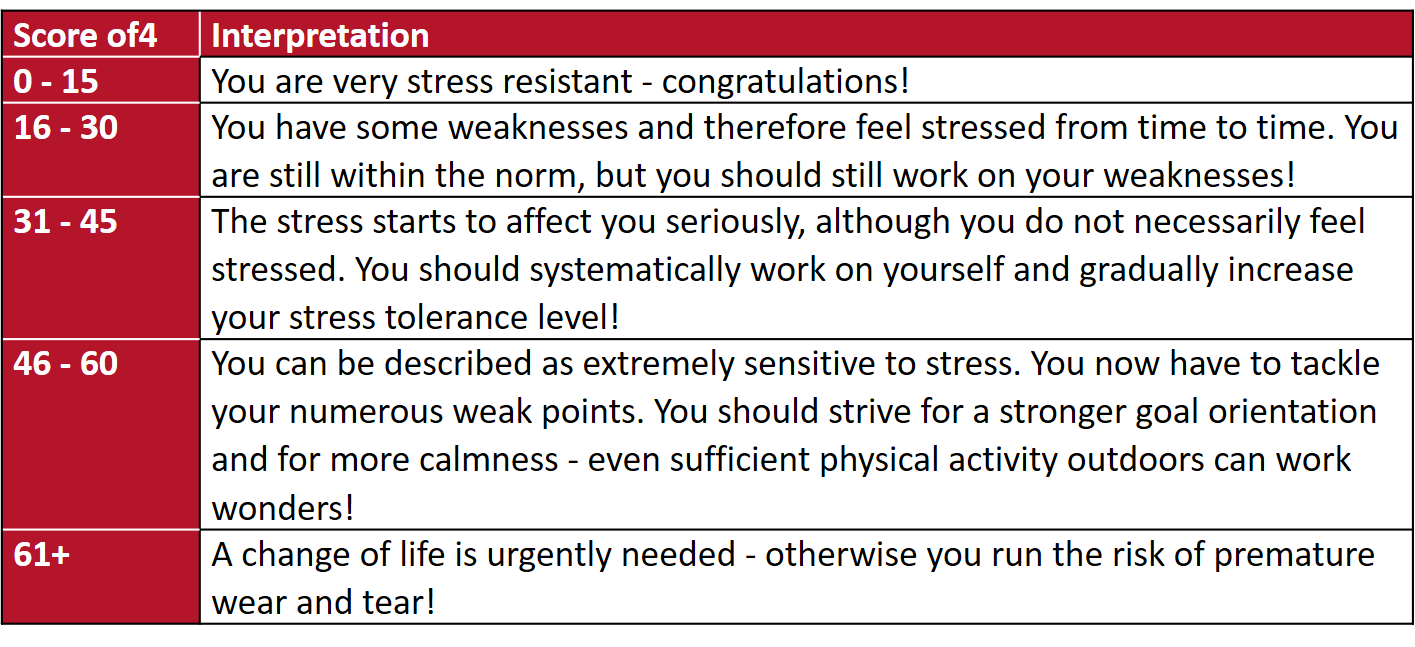
Positive and negative stress¶
When dealing with stress, it is also important to remember that there are two types of stress:
- Positive stress (eustress)
- Negative stress (distress)
While eustress means incentive and challenge for one person, it is connected with activities that one experiences as joy and success and thus represents the spice of life, so to speak. Distress becomes a disease factor when the organism is in constant alert, when all activities and the associated circumstances are perceived as a burden and failure is the order of the day. At the same time, not all people react physiologically in the same way to stress situations. While one becomes aggressive and goes ballistic in a stressful situation the other colleague remains silent on the same subject and bottles up everything.
Distress should be recognized and counteracted so that the health problems described above do not arise. To reduce distress the following methods can be useful. And remember: The better you do project management, the lower your stress level will be.
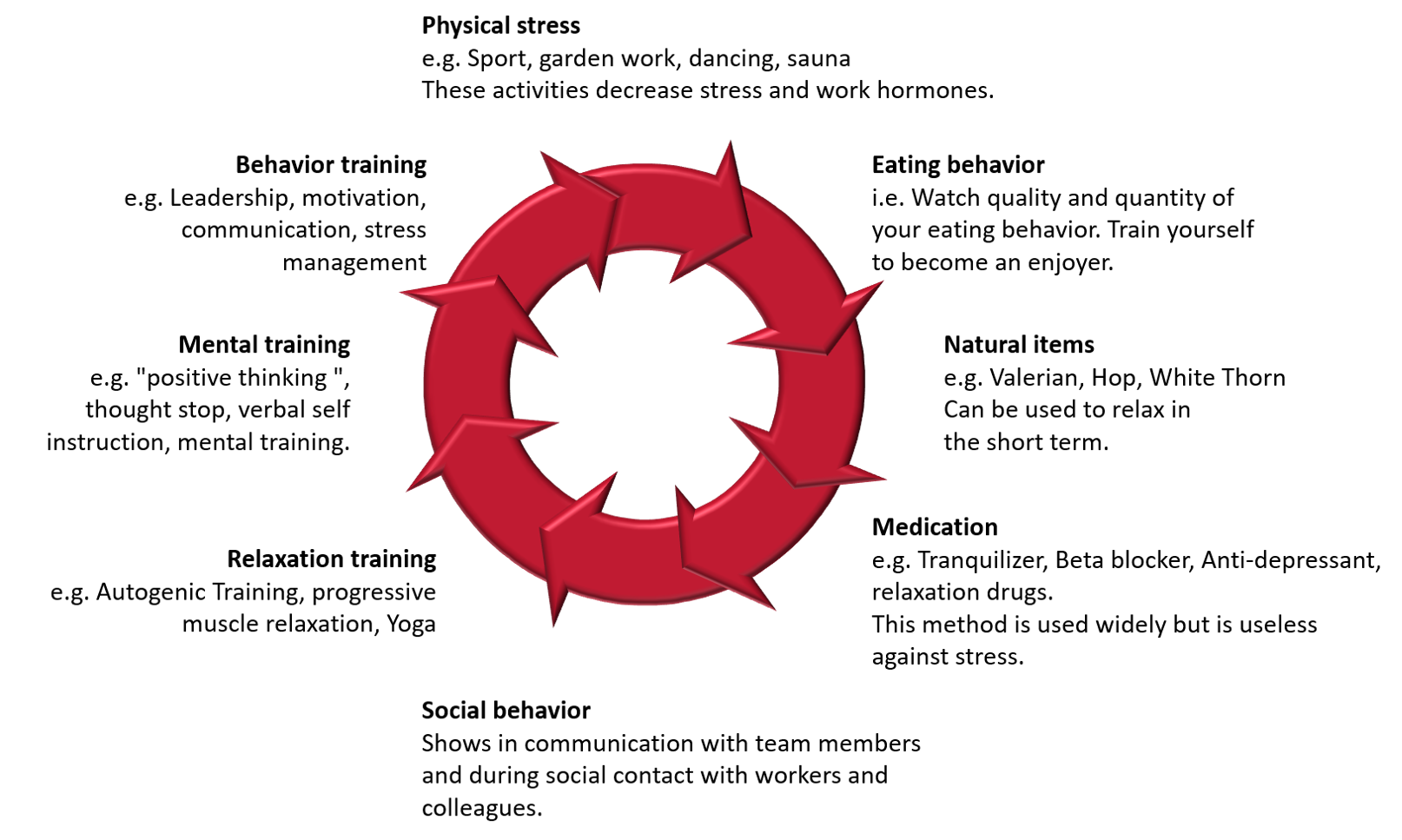
Stress categories¶
As mentioned above there are many methods to reduce your stress level. But sometimes that's not even necessary. Not every type of stress has to be accepted. There is not only the unavoidable stress, but also (limited) avoidable stress. Private conflicts can often be assigned to the environment as avoidable stress, missing skills could be classified as limited avoidable in tasks and the death of a friend would certainly be assigned to unavoidable stress and the area of the person.
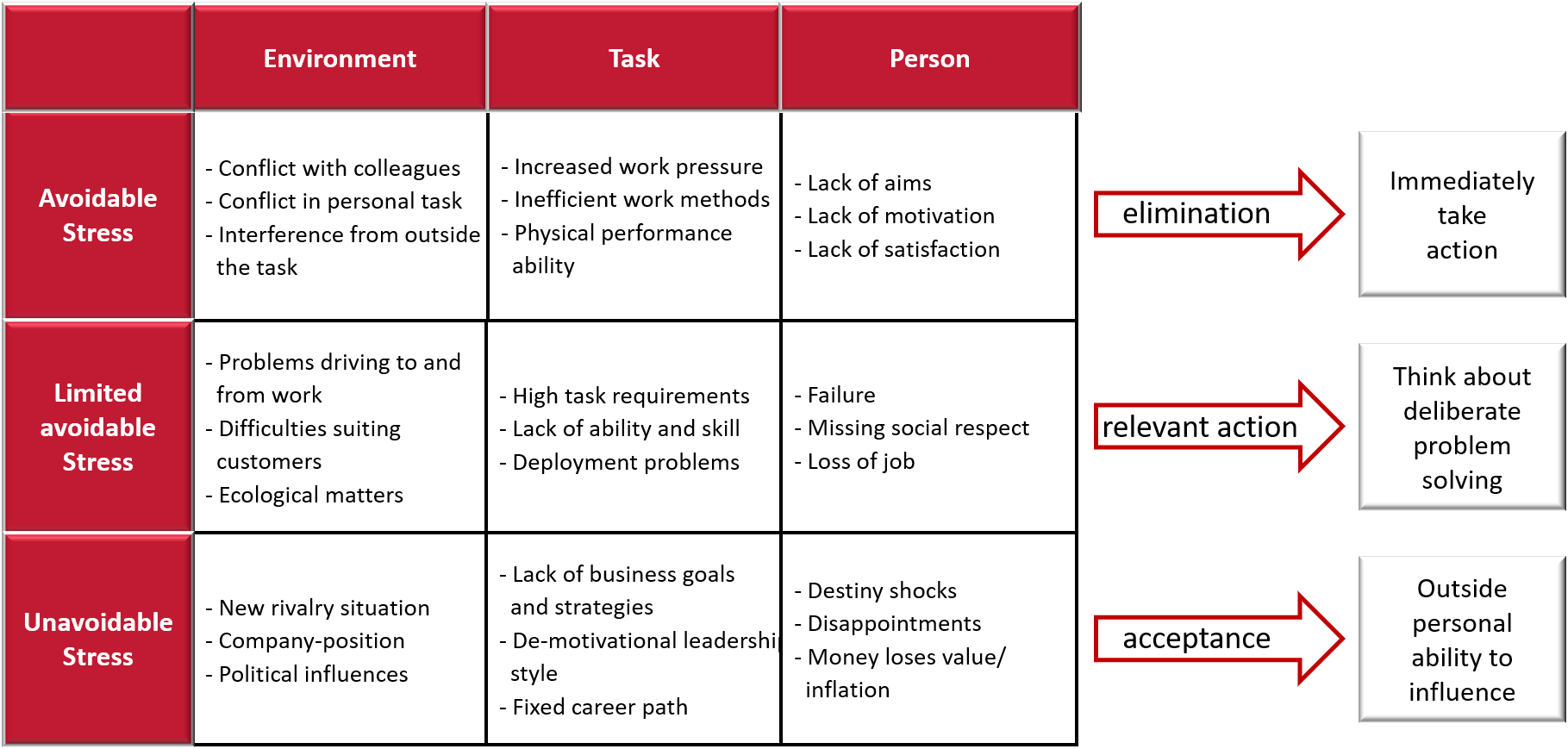
Summary¶
To summarise the keywords of that chapter, here is a quick overview:
| Technical term | Definition |
|---|---|
| Types of stress | Eustress (positive stress) Distress (negative stress) |
| Four phases of stress | 1. Alarm phase 2. Preliminary phase (moment of shock) 3. Defence or action phase 4. Recovery phase → return to the normal starting position |
| Stress categories | Avoidable stress → elimination Limited avoidable stress → relevant action Unavoidable stress → acceptance |
Test yourself!¶
Now it is time to check your knowledge.
Answer the following questions for yourself. Please take your time and think carefully about what you would answer before revealing the solution.
What is stress management?
Stress management is a collective term for the methods applied to manage stress.
What is the objective of stress management?
The objective of stress management is to mitigate or eliminate psychologically damaging stress.
When is it useful to apply stress management methods?
When a person's resistance and self-healing powers are depressed by internal and external stress and no longer suffice to maintain performance or health.
Is this true or false? Stress management can be learned.
True
Is this true or false? Exercise and a healthy diet, relaxation and mental training as well as time management are helpful in managing stress.
True